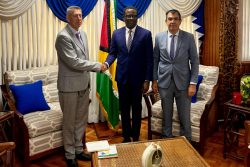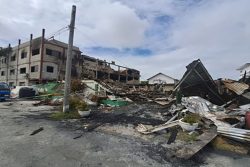By the time this editorial circulates, those member countries of the Organization of American States (OAS) who were represented in Los Angeles at the IXth Summit of the Americas would have been close to winding up the discourses and deliberations. That said, the likely implications of the events that preceded the Summit itself are unlikely to escape the attention and cogent analysis of watchers of hemispheric affairs, serving as they did as a pointed demonstration of the pecking order within the hemispheric grouping.
In short, the events that preceded the summit itself underlined, not for the first time, the assertion by the United States of its position as first among equals in the hemispheric pecking order. They served as a sobering reminder to the rest of the hemisphere (as if we needed reminding) that the perpetual noises about sovereignty and equality among states, here in the hemisphere, always ceases at the juncture where the United States perceives its vital interests to begin.
This week’s Summit of the Americas could hardly have been convened at a more poignant juncture in the history of the hemisphere. This, for reasons that have to do not just with contemplating its particular place in the wider sphere of international relations, but also from the perspective of realising wide-ranging discourse at the highest levels on the prevailing differences/ disagreements within the hemispheric grouping of which there are plenty – and seeking to arrive at some sort of modus vivendi on how to approach the resolution of such differences, some of which are particularly weighty ones.
By making public its position that three member countries of the OAS: Cuba, Nicaragua and Venezuela were not welcome in Los Angeles the United States not only issued a reminder of its status as ‘first among equals’ in the pecking order within the hemispheric grouping but underscored an intention to continue to exert control over the ideological timbre of the movement, going forward.
Occurring at a time of heightened global conflict, instability induced by issues that include, Covid-19-related socio-economic consequences, climate change and the delicate balance in which East-West relations, the Los Angeles summit would have been seen not just as a fitting forum for the hemisphere to weigh-in on wider global problems but also to engage in its own introspection with regard to the plethora of social, economic and political challenges confronting member states and seeking to begin to fashion an agenda for the start of a process, hopefully, towards resolution of some of those problems.
There can be no question than that Washing-ton was aware, beforehand, that there was bound to be consequences arising out of the Biden administration’s decision to not invite Cuba, Nicaragua and Venezuela to the summit. It did so apparently not only without any serious consultation with the rest of the hemisphere, but also in a manner that imposed what it sees as its first-among-equals prerogative to exclude whomsoever it chose to. It did so, as well, seemingly with a deliberate absence of mindfulness of the right of the other member countries to have any say whatsoever in the matter of the attendees at what is in fact a forum of member states of the hemisphere, not a private Washington Club.
Whatever differences might exist (and one concedes that there are many) between Washington and those uninvited countries, might a Summit that benefitted from a ‘full house’ not have, perhaps, allowed for the garnering of the widest possible perspectives on the challenges confronting the hemisphere, ranging from the socio-political crises facing some member countries to the pressing economic challenges confronting the vast majority of the member states? Might it not have, perhaps, taken us somewhat closer to realising what, these days, do not, by any means, appear to be incurable differences between the United States and both Venezuela and Cuba?
What the exclusion of Cuba, Nicaragua and Venezuela from the Summit meant was that the event itself was staged under a canopy of the most compelling distraction since the unilateral exclusion of the three named countries effectively allowed for the distraction of invited countries having to then make their own decisions as to whether or not they would be part of an incomplete guest list.
What appears to have been the varied responses of the remaining OAS member states on Washing-ton’s guest list only served to reinforce their acceptance of the United States’ per-eminence, seemingly over their own sovereignty, in matters pertaining to the vital interests of member states of the hemisphere, both individually and at the level of the wider hemisphere.
In the instance of the Caribbean Community (CARICOM) what we witnessed was a shambolic display of ‘sand dancing,” seemingly so laden with uncertainty and indecision among member states that the end product on the intra-regional discourses on Washington’s decision to truncate the guest list for the Summit was that each CARICOM country should be left to make its own decision as to whether to make the trip to Los Angeles, or otherwise, unquestionably not one of the Community’s prouder moments and one on which only a single CARICOM Head of Government appeared inclined to speak bluntly.







